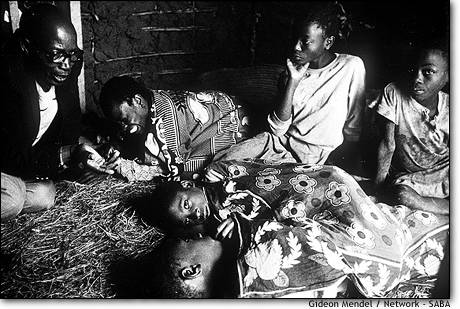
Qoshairi Manifest
Chapter 13
Sorrow (Hozn)
Allah Almighty has said:
“And they will say: Praise be to Allah, Who
has removed from
us (all) sorrow” (Said by the people in Paradise) Koran [35:34]
Abu Said Khodry narrates from
the Prophet Peace Be Upon Him
saying, “Nothing reaches a slave of
pain or sorrow or affliction or suffering
unless it expiates (Kaffarah) some sin”. Sorrow cleans the heart
from
scattering within the valley of negligence. Sorrow is the
characteristics of
the beginners of the Solook (travel upon the Sufi path).
I heard from Abu Ali Daq-qaq
saying, “Upon the path of Allah
sorrow of one month travels further than years without sorrow”. A
Hadith
(Narration of the Prophet) has informed that God Almighty loves the
sorrowful
hearts. (I do not have the Arabic text)
It is within Torah that once
Allah loves a slave places much
moaning sorrow within his heart (like the enslaved Hebrews) and once
Allah
takes a slave as enemy places much happiness within this heart (like
the
Pharaohs).
People have mentioned that
Messenger of Allah Peace Be Upon
Him was constantly sorrowful and preoccupied with thoughts.
Bahsar Bin Al-Harith said,
“Sorrow is a king not allowing
anything else to reside within the kingdom with It”. (‘It’ here refers
to the
Beloved meaning sorrow forces all things out of the lover’s heart all
is left
is Beloved)
Some have said that a heart
without sorrow withers away and
decays similar to a house without residents (To up keep the house).
(Sorrow the
maintenance for the lover’s heart)
Bu Said Qershi said, “Weeping
with sorrow may cause
blindness, however weeping with joy veils the eye but blinds not” as
was said
by Allah Almighty, “And his eyes
became white (blind) with sorrow, and he fell
into silent melancholy.” (Jacob’s sorrow for the missing Joseph,
Koran [12:84],
weeping for sorrow blinds the eyes the weeper sees nothing of this
world but
Allah, weeper of joy may have a veil for a little while but soon back
to
viewing the world greedily and ignorantly)
Ibn Khafif said, “Sorrow is
the prevention of the Nafs
(Self) from the false pleasures of this life”. (If sorrow was not there
we
would all drown in few false and short-lived pleasures of life subdued
by our
Self)
Sofian Bin Oyay-neh said, “If
there is even one sorrowful
individual within a nation, Allah shall be merciful upon that nation
because of
his sobs”.
Dawood Taa-ee was overcome by
sorrow and he prayed, “My
Lord! Night has come and Your sorrow conquered all other sorrow and
took the
sleep away from me and how can there be any solace for a person whose
sorrow
increases by the hour.” (I guess he means sorrow was piling up upon his
heart
to the point he start praying to Allah and in that moment he realized
the
triumphant moment has reached i.e. he is alone with Allah and there is
nothing
else in his heart!)
Some have said as the sorrow
makes the person losing
appetite for food, similarly he loses appetite for committing sins.
Serry Saqaty said, “I wish for
myself the sorrow of all
people”. (Our Beloved nests within every broken saddened heart so
Saqaty wants
to have the maximum residence/presence of Beloved in his heart)
Much has been said about
sorrow by Sufis but most have
agreed that praiseworthy sorrow is that of the sorrow for the world
after but
the sorrow for this world is disgraceful. All forms of sorrow bring the
believer much Fadhl (Excess of merit & virtue).
One of the Sufi old (Pir)
sages found out that a student of
his was traveling and requested, “Wherever you find sorrow send my
greetings”.
(Because Beloved is in that place of sorrow)
I heard from Abu Ali Daq-qaq
that an old sage was once
talking to the Sun while setting, “Did you shine upon any sorrower
today?” (let me
know about their whereabouts)
Wakey’ said, “Once Fadhil
(Excessive Generosity of Allah)
was ordained there came the dawn of sorrow. The best pages of a slave’s
book of
deeds are goodness of sorrow (good deeds sorrow caused him to do)”.
Fodhayl Ayadh quotes the Pir
(old sages) of Sufism believe,
“For everything there is a Zakat (charity that purifies that thing) and
the
Zakat for the mind is the prolonging of the sorrow”.
Abul-Hussein Warraq quoting
Abu Othman, “The sorrower has no
fear to ask (from Allah) anything through his sorrow, so seek sorrow
(by
sacrificing yourself in daring causes) since then you would be able to
ask for everything (from Allah)”.
End.
Background:
Deocres
Francis, left, a counselor from WAMATA, an organization that supports
people HIV infected people in Tanzania, visits the home of the Katwala
family. Here he attempts to comfort the mother, Regina, while two of
her infected children, Sela and Severea, twins aged seven, are huddled
under a blanket on the floor of their hut. (June 97)
Download
©
2004-2002, Dara O. Shayda

